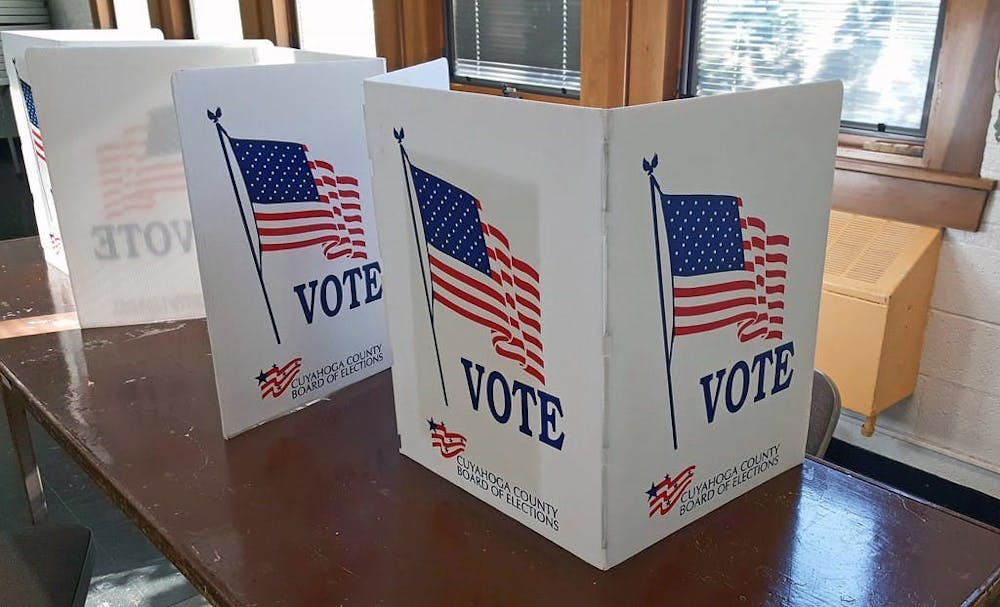The Student Government Association (SGA) unveiled a new resource for disseminating voting information at its weekly meeting on Oct. 13.
Senior Class Senator Keidai Lee presented the Voter Guide 101 website that he created with Freshman Class Senator Harvey McGuinness. According to Lee, this guide is intended to provide a more streamlined resource for people to figure out their voting plan.
Lee presented the various links and sections that will be available on the website. However, the resource has yet to be completed.
Senior Class Senator Ananya Kalahasti questioned why the need for an additional resource when TurboVote exists, emphasizing that deadlines for voter registration will pass next week.
Lee noted that the director of Hopkins Votes supports the creation of the website, and he shared his personal struggles with using TurboVote. He also highlighted that deadlines may be upcoming but are not over. This resource, he said, will still be helpful for those who are not registered.
“I’ve used TurboVote before too, but I was very confused by the structure of it. Also, I’m not a big texter, and the user interface is not really pleasant. Having an information-first model allows more accessibility to make people more open to knowing when the deadlines are,” Lee said. “Having the right information is great, but design is extremely important.”
Sophomore Class President Anthony Singleton and Executive Secretary Breanna Soldatelli praised the new resource, expressing that more avenues of information are always better.
However, Junior Class President Nathan Mudrak countered that having multiple resources may make it more difficult to keep sites updated.
“I just want to be sure that we’re not pushing any misinformation on students, especially when voting rules are changing pretty frequently with COVID,” he said. “How are you designing the site to make sure we are always providing up-to-date information for students?”
The website, Lee said, mostly consists of links that point to other links that do update on their own. He is still working on finishing the website and adding a few more links.
As of Oct. 18, the resource is officially a collaboration between SGA’s Civic Engagement Committee (CEC) and Hopkins Votes.
As part of SGA’s efforts to increase voter registration, Junior Class Senator Grace Wang shared that the CEC recently launched its Hopkins Votes ambassador program for student organizations, which has been successful. She asked members to continue promoting voter registration with their student organizations to get more people to commit.
In addition, Executive President Sam Mollin discussed SGA’s role in choosing members of the Undergraduate Academic Ethics Board, a subcommittee of the Academic Council.
Mollin stressed that SGA has not been part of selecting Ethics Board members in the past two years, and there are no mentions of it or formal procedures for selection of members in SGA’s constitution and by-laws.
“This is the only opportunity we have to make sure we are being heard not just by administration but by our peers when we are accused of violating agreements we abide by when we attend this University,” he said. “It’s a principle of justice systems around the world, and it’s really important to have the right to be heard when you’re accused of something.”
According to Mollin, the administration has agreed that SGA should play a larger role in the nominee selection process. He is seeking help from other SGA members who might be interested in assisting to create the new program.
Lee noted that while some peers may help the Ethics Board understand students’ situations better, this could also have a potentially negative impact on ethical proceedings and decisions.
“This can also be a double-edged sword because some people who are peers can also be worse if they have selfish motives or not enough life experience to understand another person,” he said. “Is there a way to create a vetting process that selects people more intentionally?”
Mollin explained that there is no set plan yet for how SGA will become involved in the process. However, he agreed that a standardized vetting process could be worth looking into.
SGA also voted to sign a letter of support for the MaryPIRG Student Climate Action Coalition’s (MSCAC) Student Climate Action Coalition Bill Proposal, which SGA had tabled at its meeting last week. Junior Class Senator Megan Chien described the purpose of MSCAC’s proposal.
“We took input from everyone in SGA who wanted to comment on the letter,” she said. “The MSCAC is trying to convince the Maryland legislation that the climate crisis is real and garner support from public colleges in Maryland.”





